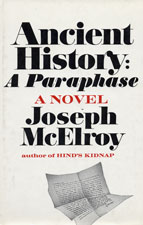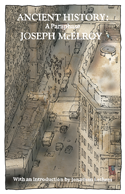


2nd Edition, 2014, with introduction by Jonathan Lethem |
Ancient History: A Paraphaseby Joseph McElroy Edition History:
|
|
An uninvited guest, entering the empty New York apartment of a man known to intimates as "Dom," proceeds to write for his absent host a curious confession. Its close accounts of friendship since boyhood with two men surely unknown to Dom and certainly to each other is interleaved with the story of Dom himself. This narrative which at first seems beamed from the narrator’s fear that he may have helped cause Dom’s supposed suicide, opens into the violent geography of Dom’s career as late-Sixties activist-ideologue. It is in one of Dom’s ideas — the physicist’s field-state turned into the psychic space of human community — that the narrator imagines a new way of gauging relationships. Experiences ambush him, memorable, measurably ominous yet open — a boy’s deep and almost disappearing dive into a mountain quarry pool; the flight of a boomerang thrown from the Brooklyn Bridge out toward the Statue of Liberty. New sectors swing into the narrator’s account of middle-class life in the Brooklyn Heights of the 1940s and 50s. Delicate anatomies of old girlfriends performed with nostalgic instinct; anxious confidences, painful and building, roused now by the narrator’s thoughts of his daughter, his wife, and the son from her first marriage. All the while, the two friends Al (from the country) and Bob (from the city) grow toward each other on these pages, as Dom, increasingly alive, seems increasingly distant. Yet at last — as if by some strange grace of nature — the narrator is given a sense of his own life very like the field-state into which he has tried to work his way by use of a controlling craft: the craft of an anthropologist ... that of an only child dwelling on friendships ... that of an artist looking for America both in its public stars like Dom and more faithfully in familiar mysteries of private life. |
|
Reviews for Ancient History: A Paraphase |
|
|
Christopher Lehmann-Haupt New York Times, May 26, 1971, ...there is a coherence of development as absorbing as the squarest linear plot, a tension in the seeming randomness that keeps one leaping back and forth in time from scrap of incident to slant of memory as nimbly as an acrobat. ... What is this ancient history? It is a course the novel's narrator (...named Cyrus, after the founder of the Persian empire) once took ... the rise and fall of pre-Christian kingdoms, the chronicles of Herodotus and Thucydides. It is Cyrus's childhood and adolescence -- winters in the 1940s and 1950s in Brooklyn Heights, summers in a small town ... It is all of the past, in other words, ...as it arcs through memory into the present and away again into projections of the future, thus forming a parabola. ... Something that happened during a stickball game in Brooklyn Heights; something about swimming in a Massachusetts quarry; something about falling out of windows; something in ancient history -- all spin together to generate an electric field that crackles with the vitality of contemporary American life. And draws the reader in. |
|